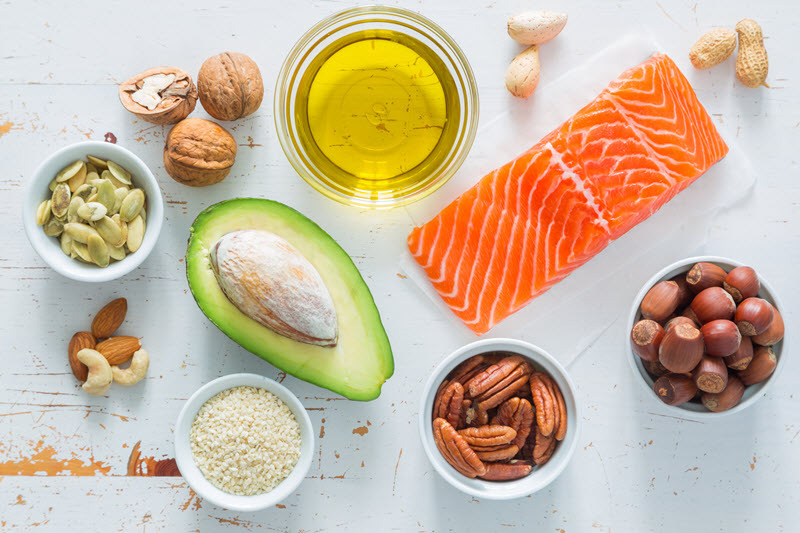How much saturated fats can I have a day?
Q: I understand that I am supposed to be eating items lower in fat while I am trying to lose weight, but I am a little confused about saturated fats. Is it good or bad for me? Your clarity is appreciated
A: Saturated fat is a type of fat molecule that is saturated with hydrogen atoms, meaning it has no double bonds between carbon atoms. This saturation gives it a solid form at room temperature and makes it more stable for cooking. It's commonly found in animal products such as meat, dairy, and eggs, as well as some plant-based sources like coconut oil and palm oil. We get saturated fat primarily from our diet, especially if we consume a lot of processed foods, fried foods, fatty meats, and full-fat dairy products. It's also present in some natural foods like coconut and certain types of nuts and seeds. Saturated fats can be found in fatty cuts of meat, buttery pastries, creamy cheeses, and decadent desserts. It's also hiding in some unexpected places like processed snacks, fried foods, and fast-food meals. Knowing which foods are high in saturated fat allows us to make better choices when grocery shopping and dining out.
While on this topic, let’s tap into other forms of fat that we consume:
1) Unsaturated fat- Unsaturated fats tend to be liquid at room temperature, while saturated fats are solid. There are two types of unsaturated fats, monounsaturated fat and polyunsaturated fats. Both are vital to our bodies. These are the best types of fats for us.
a) Monounsaturated fat- Monounsaturated fats are plant-based fats that reduce the risk of cardiovascular disease and provide health benefits especially when used to replace saturated and trans-fat. This includes olive oil, canola oil, avocado, peanut butter and many seeds and nuts.
b) Polyunsaturated fat- Polyunsaturated fats are divided further into omega-3 and omega-6 fatty acids. These fatty acids are essential, promote heart health, and provide an anti-inflammatory effect. Sources of Omega-3 fatty acids include: Tuna, salmon, sardines, flaxseeds and flaxseed oil, walnuts and chia seeds. Sources of Omega-6 fatty acids include: Safflower oil, sunflower oil, corn oil, soybean oil, sunflower seeds and pumpkin seeds.
2) Trans fats increase LDL (bad) cholesterol and lower HDL (good) cholesterol. They are very unhealthy. Artificial trans fats are liquid oils that have been turned into solids in an industrial process. They are found in many fast foods, processed foods, and foods packaged with preservatives. Naturally occurring trans fats are in some dairy and meat products. The best way to ensure a food is trans-fat free is to read the ingredient list and ensure “partially hydrogenated oils” are not listed. Sources of trans fat include: Fried foods, pie crusts, packaged cookies and crackers, margarine and many processed and prepackaged foods. Because our bodies do not need any trans-fat to function, consume as little as possible, if any at all. Read food labels carefully and substitute trans-fat with a source of monounsaturated fat or polyunsaturated fat when able.
Back to saturated fats. Are saturated fats good for us? A million-dollar question! The answer isn't straightforward. While small amounts of saturated fat are necessary for various bodily functions like hormone production and cell structure, excessive consumption has been linked to an increased risk of heart disease and other health issues. It can raise levels of LDL cholesterol (the "bad" cholesterol) in the blood, which can contribute to the buildup of plaque in the arteries, leading to heart problems. The American Heart Association, recommends aiming for a dietary pattern that achieves 5% to 6% of calories from saturated fat. For example, if you need about 2,000 calories a day, no more than 120 of them should come from saturated fat. That’s about 13 grams of saturated fat per day.
Saturated fat itself isn't solely responsible for weight gain. Weight gain occurs when we consume more calories than we burn, regardless of whether those calories come from fat, carbohydrates, or protein. However, foods high in saturated fat tend to be calorie-dense, so overconsumption can contribute to weight gain if not balanced with physical activity.
Instead of reaching for that extra cheesy pizza, opt for leaner protein sources like grilled chicken or fish and load up on colorful fruits and vegetables. Choose low-fat or fat-free dairy products and use healthier cooking oils like olive oil or avocado oil instead of butter.
Reading nutrition labels can also be eye-opening. Look for products with lower saturated fat content and be wary of hidden sources in processed foods. And remember, moderation is key. It's okay to indulge occasionally, but making healthier choices most of the time will have a positive impact on your overall health. The more important thing to remember is the overall dietary picture. Saturated fats are just one piece of the puzzle.



 6 min
6 min


